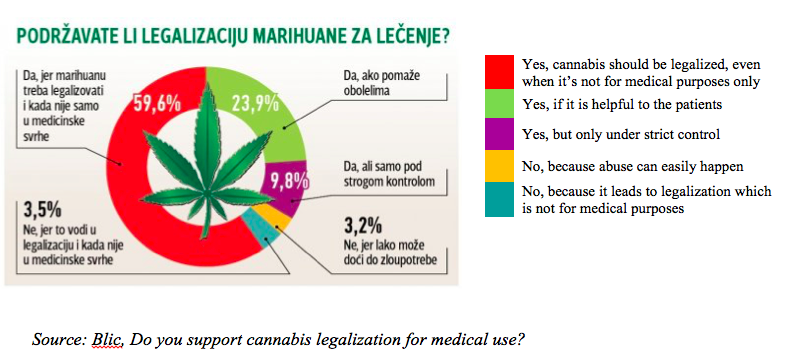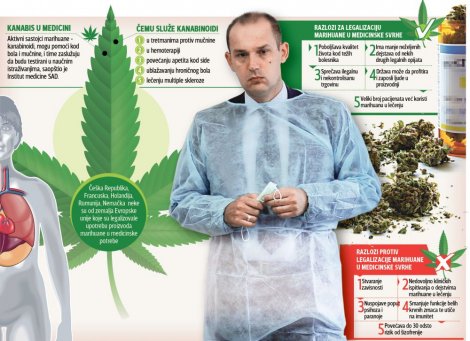Regulated medical marijuana has come out of the blue as a feasible alternative in Serbia, where overwhelming public support favours regulating hemp-based medicines. The promised draft law is still awaited, however, and will then require the approval of the national parliament.
This September, we felt like Europeans, as in the space of a single week, the long-awaited gay parade took place, and the first public debate and workshop regarding cannabis regulation for medical purposes. Living in an ex-socialist country with an extremely right-wing government at the moment, I wasn’t anticipating such quick developments in freedom rights.
Serbia unfortunately doesn’t have armies of drug policy advocates and sufficient funds to support the efforts of cannabis regulation. The situation developed rather quickly and suddenly, when a small group of young activists decided to speak to the Minister of Health regarding the decriminalisation of cannabis use for medical purposes, and received a positive response. “We did not expect to be supported by the Minister of Health, Zlatibor Lonar – but fortunately, he was aware of the possibility of using cannabis for medical purposes,” said the instigator of the debate, Vladan Golubovic.
Within a week, all the newspapers, TV and radio stations were talking about cannabis regulation for medical purposes. To the surprise of many experts in the country, there was no real opposition to the idea, with even the Serbian Orthodox Church, despite its reputation for being vocally in favour of prohibition, not arguing against it.
Minister Lonar publicly supported the idea: “Anything that brings results in treatment, even if it’s marijuana, enjoys the support of the Ministry of Health. There are a number of studies providing evidence that cannabis has medical value.” All the other ministries within the Serbian government stayed unusually quiet throughout the public debate.

The State Secretary from the Ministry of Health stated, “The Minister has courageously stepped forward to give public support to this idea, because the law is supposed to serve the people, not the other way around. I think that no great fuss should be caused by legalisation”. It definitely took courage to support such a progressive, politically delicate initiative for drug policy reform in Serbia, since none of the other government officials were willing to comment on the subject.
The concept of cannabis regulation, moreover, turned out to have majority support. Results from a short survey conducted by the largest daily newspaper, “Blic”, concluded that the majority of those questioned were in favour of what Serbians are calling a “revolutionary drug policy reform”. Almost 11,000 people took part in the survey, and the results show that 59.6% support the legalisation of cannabis for recreational use, while 23.9% think it should be decriminalised for medical purposes only, and another 9.8% believe it should be regulated, but subject to strict controls. If we add up those numbers, 93.3% of respondents supported the idea of cannabis regulation in some form.
 A public debate, entitled, “Hemp in Serbia – then and now” was held recently, hosted by a well-known medical marijuana activist, Rick Simpson, founder of the Phoenix Tears Foundation. He was joined by Robert J. Melamede, PhD, Associate Professor, Department of Biology, University of Colorado, President and CEO of Cannabis Science Paul Hornby PhD, researcher, president of Hedron Analytical Inc., as well as medical specialists and lawyers from Serbia. The public debate was held amid high levels of public interest. Contrary to expectations, participants in the public debate were, in the main, not young people who use cannabis for recreational purposes, but worried patients in need, accompanied by their families. Numerous public figures spoke publicly about their experiences with the still-illegal treatment with cannabis. The extremely lively, loud and emotional discussion took more than two hours. Individual patients and patient organisations demanded that cannabis be regulated for medical use, with personal life stories of arrests and incarceration related to the possession and/or production of cannabis.
A public debate, entitled, “Hemp in Serbia – then and now” was held recently, hosted by a well-known medical marijuana activist, Rick Simpson, founder of the Phoenix Tears Foundation. He was joined by Robert J. Melamede, PhD, Associate Professor, Department of Biology, University of Colorado, President and CEO of Cannabis Science Paul Hornby PhD, researcher, president of Hedron Analytical Inc., as well as medical specialists and lawyers from Serbia. The public debate was held amid high levels of public interest. Contrary to expectations, participants in the public debate were, in the main, not young people who use cannabis for recreational purposes, but worried patients in need, accompanied by their families. Numerous public figures spoke publicly about their experiences with the still-illegal treatment with cannabis. The extremely lively, loud and emotional discussion took more than two hours. Individual patients and patient organisations demanded that cannabis be regulated for medical use, with personal life stories of arrests and incarceration related to the possession and/or production of cannabis.
Organisers were very optimistic, announcing, “If the government agrees, it is realistic to expect that we will work on changing the law in November, legalise cannabis use for medical purposes by the spring, and harvest our first crop of cannabis next September!” The estimate turned out to be unrealistic: Three months passed by, and not much has happened since. Public debate still continues, especially in the media. Coverage is mainly focussed on progressive drug policies in other counties, the benefits of medical marijuana, the pros and cons of cannabis legalisation, and patient stories. Students are organising public debates on numerous faculties in the country, while the Law on Psychoactive Substances remains as yet untouched. During the same week when the debate was held, Serbian police proudly announced that they had arrested a young man for possession of couple of cannabis seeds, because the Law on Psychoactive Substances prohibits possession of any part of a scheduled psychoactive plant, from the root to the top. Obviously there is a long way to go before full decriminalisation of medical cannabis use in Serbia. On the other hand, the debate has started, and patient advocacy efforts will be crucial for completing the task.
All in all, it turns out that grass always seems to be greener on the other side of the fence.
Jovana Arsenijević, Re Generation





